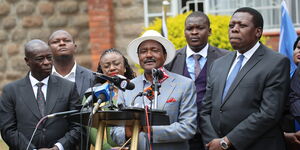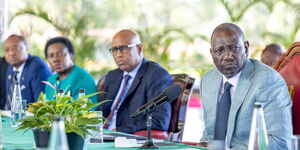National Assembly Speaker Justin Muturi has put forward a proposal for the abolishment of presidential elections.
Appearing before the Building Bridges Initiatives (BBI) taskforce led by Garissa Senator Yusuf Haji on Tuesday, March 10, Muturi asked that the report takes into consideration the 'pitfalls' encountered during the heavily contested election campaigns.
Muturi asked that the election of heads of state and governors by the universal suffrage be done away with, instead be replaced by the election of political parties. The President would then be nominated by the party that garners the most votes.
“In order to build a bridge that allows us to transcend the pitfalls of heavily contested presidential elections, it is proposed to remove election of President by universal suffrage,” Muturi proposed.
“Instead, the popular will of the people manifested through one man one vote should be actuated through the nomination of President by the Party that garners majority votes at the general election," he added.
Muturi argued that a similar system for the counties would be a good fit. The popular party in the gubernatorial polls would nominate the governor and the deputy.
In the proposal, the speaker called for the introduction of performance-based criteria to curb the number of political parties, something he argued would instil party discipline.
“I propose that a political party that fails to win any seat in the National Assembly at a general election should be struck off the register of political parties. Additionally, stricter provisions should apply in the registration of new political parties,” Muturi stated.
The second-term House speaker recommended the remodelling of representation in the National Assembly to achieve equality, especially in the highly populous constituencies.
“The National Assembly should represent the people of Kenya on the basis of a national formula that as nearly as possible reflects the principle of one man one vote, rather than on the basis of the outcome of tribal and clan contests at the constituencies,” Muturi recommended.
“What would it take to achieve a ratio where each Member of the National Assembly represents 200,000 citizens?” he posed.
Muturi's proposal comes at a time when the country is in a debate on the structure of governance best built to fulfil its mandated to members of the public.
While it just remains a proposal, the ruling Jubilee party comes into question following numerous reports of disagreements and parallel factions within the party.












